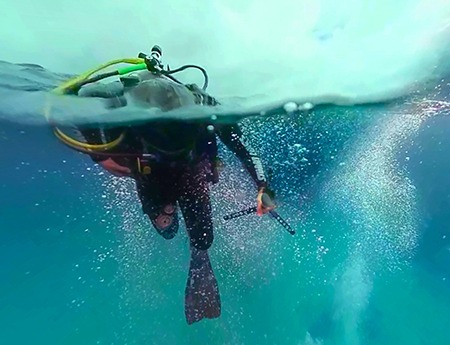Discovery Gets Ahead of VR Curve

The smarter way to stay on top of broadcasting and cable industry. Sign up below
You are now subscribed
Your newsletter sign-up was successful
Virtual reality (VR) isn’t expected to become a mainstream phenomenon for a few years, but Discovery Communications isn’t waiting around or merely dipping its toe in the water.
Rather, the Silver Spring, Md.-based cable programmer is plunging headfirst with a major initiative through which it will develop a slate of VR programming tied into some of its most popular shows, alongside a variety of digital originals.
“It’s about getting out ahead of the curve,” Conal Byrne, senior vice president of digital media at Discovery, said. “I think virtual reality is not hype. I don’t think it’s a medium that is going to come and go, frankly, like it already did once.”
That last comment might conjure up images of the Virtual Boy, the short-lived portable video game console from Nintendo from the mid-1990s.
But VR technologies have begun to mature, aided by the rise of broadband, which provides a perfect conduit to distribute apps and video that provide an immersive experience.
CROSSING OVER PLATFORMS
In Discovery’s case, its new initiative, called Discovery VR, will be cross-platform — it will provide apps and content for iOS and Android devices, the Samsung Milk VR platform and YouTube. In addition to plans for higher-end platforms such as the Oculus Rift, Discovery VR’s apps will also be made to run on Google Cardboard, the inexpensive VR viewer that can be paired with a smartphone.
The smarter way to stay on top of broadcasting and cable industry. Sign up below
Discovery, Byrne said, is also excited about Facebook’s plan to launch a “spherical video” offering that will be integrated with its popular social-networking platform. Facebook, which acquired Oculus Rift last year for $2 billion, announced that initiative in March at its F8 developer conference, but has not set a launch date.
“I just can’t wait for that; it’s going to be fantastic,” Byrne said, noting that Discovery has a massive built-in audience on Facebook (at last check, the programmer was approaching 35 million Facebook “likes”).
A big key to VR’s success will be its ability to deliver an immersive experience on several platforms, including easily accessible ones such as YouTube and mobile apps that can be paired with Google Cardboard, Byrne said.
Those options provide “a way to get VR in front of millions of people with zero barrier to entry,” he said. “You literally just have to make sure that your YouTube app is updated and you’re good to go.”
Other programmers are also exploring and experimenting. Of recent note, NBCUniversal’s Syfy launched an iOS and Android app for Google Cardboard to promote The Expanse, a drama series set to premiere in December.
Early on, Discovery (with VR partner Littlstar) will take a two-pronged approach to producing VR content — short-form videos linked to popular and established network programs and franchises such as MythBusters, Survivorman, Gold Rush and “Shark Week,” and digital originals under the “Adventure” and “Planet” headings. Adventure, for example, will feature freeboarders (who ride snowboard-like skateboards) winding through Lombard Street in San Francisco, while Planet will offer virtual tours of locales such as California’s Redwood Forest and Half Moon Bay.
Byrne said the initiative is beyond providing VR clips for a show to get pickup on social media and build toward a TV premiere. “It’s really about trying to figure out if there’s a whole new way to narratively talk about [shows] on VR,” he said.
PUSHING HARD ON ORIGINALS
Discovery has not yet committed to creating full-length shows in VR, but the near-term plan is to continue to support existing franchises with virtual reality fare and to “really push hard on digital original [content],” Byrne said.
And Discovery already has lots of content in the bank. “We have enough virtual reality content that we have already shot to publish a robust slate of content for a full year if we didn’t shoot any more,” he said. “We’ve been experimenting a lot.”
As for the other reason why VR has moved beyond the hype cycle, Byrne said the TV industry has become particularly collaborate and supportive, rallying those passions toward the success of the VR business.
“It feels like the industry is a little more mature and more serious-minded and thoughtful, as opposed to being hype,” he said. “There’s a very community-driven spirit right now.”
